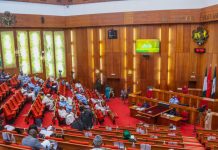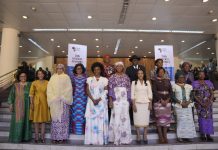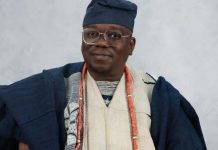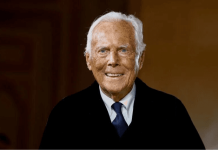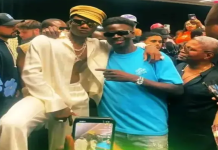Please, Let Yahaya Bello Breathe
By Sadiq Abdullateef
IN the unpredictable world of Nigerian politics, loyalty, popularity, and effectiveness are often twisted into liabilities by those threatened by rising stars. One man who now finds himself under constant fire—largely from orchestrated political machinery—is former Kogi State Governor Yahaya Bello.
Despite his track record of commitment to national unity, youth empowerment, and institutional support—especially in media development—he remains the target of relentless, unfair media assaults by political detractors uncomfortable with his alignment with President Bola Ahmed Tinubu and, perhaps his influence in northern Nigeria.
It is both shocking and deeply disappointing to witness the extent to which some of those who should know have allowed themselves to become instruments in the hands of desperate politicians.
These are individuals who once stood as gatekeepers of truth, defenders of journalistic integrity, and mentors to younger ones.
Today, some of them have reduced their once-revered platforms into megaphones for political vendettas and manufactured narratives. The erosion of professional ethics is not just a betrayal of public trust—it is a disservice to the nation.
When professionals choose to allow their pages to be filled with unverified claims, defamatory attacks, and politically motivated hit pieces, they become no better than the politicians pulling the strings.
In a profession where appreciation often comes in whispers and sacrifice is taken for granted, it is important to speak boldly when someone goes above and beyond for the press community.
Former Governor Yahaya Bello, through his personal interventions and the dedication of his media aides, has shown a consistent pattern of compassion, humanity, and solidarity with journalists and editors across the country. It is a fact.
Many may not speak publicly about it, but those of us who are close to many beneficiaries know the truth—Yahaya Bello has been a rare pillar of support for members of the fourth estate.
I say this not just as an observer but as a beneficiary. When my wife was seriously ill and hope seemed to fade, help came—unsolicited—from Yahaya Bello’s media team, within minutes, and without stress.
It was not a campaign stunt. There were no cameras or press releases. It was simply an act of concern from someone who saw a need and responded swiftly. And I am not alone.
There was a case involving a fellow member of the Guild of Editors who fell critically ill. Before anyone could raise a formal request, Yahaya Bello’s aide sent a significant financial donation. When the editor sadly passed away and the hospital refused to release the body due to outstanding bills, the same team contributed handsomely to ensure the family could lay him to rest with dignity. And these interventions, his team said, should not be announced!
Time and again, we have heard similar accounts—of journalists practising in Kogi who received life-saving medical assistance, hospital bills paid in full, and families supported during times of grief.
Yahaya Bello did not discriminate based on affiliations or proximity.
To him, the welfare of media professionals was not transactional—it was simply the right thing to do. He understood the value of the press, and rather than see journalists as enemies to be silenced, he saw them as stakeholders to be supported.
Now, because he has a case with the EFCC—a situation not unique to him but shared by nearly every former governor—some think he should be vilified and erased from public goodwill?
Should one investigation nullify years of tangible kindness and silent service? We cannot build a better nation by throwing stones only at those who once stood for us in our quietest battles.
Yahaya Bello deserves to be recognized not just for his politics, but for his humanity. In a system that often forgets the journalist once the headline is written, he has chosen, repeatedly, to remember and to act. That, in itself, is worth celebrating.
Therefore, It is no exaggeration to say that Yahaya Bello is one of the most polarizing yet dynamic figures in modern Nigerian politics. His tenure as governor of Kogi State was marked by bold initiatives, particularly his investment in youth empowerment, security, and institutional capacity building.
One of the less-publicized, but highly impactful initiatives was his administration’s commitment to strengthening the media landscape. Over the course of three consecutive years, his government sponsored the training of over 250 journalists across the country, improving not just media practice but also fostering independent, ethical journalism.
It is an established fact that Yahaya Bello deserves every award, recognition and commendation from any govt and institution in Nigeria based on his support and contribution to media growth, development and its modern-day technological advancement.
A recent case in point is the deeply troubling accusation made by Senator Natasha Akpoti-Uduaghan, who alleged that Yahaya Bello was contracted by the Senate President to assassinate her. The gravity of such a claim demands proof, not political theater.
In a nation governed by laws, defamation of this nature should not go unchallenged, and Yahaya Bello was right to file a lawsuit demanding evidence.
The court, and indeed the public, deserve clarity on such serious matters. No one should be above accountability—neither those accused nor those making accusations without proof. It is this same principle of fairness that Yahaya Bello seeks to uphold through legal redress.
But beyond these allegations lies a more insidious plot: the uncomfortable truth that some politicians feel threatened by Bello’s rising popularity, particularly in his domain, considering the fact that President Bola Tinubu can spot a performer even in the dark.
In a party where regional balancing, loyalty, and perception matter, Bello’s visible appeal among the youth—especially in the North—makes him a threat to entrenched political interests. As 2027 draws closer, this “threat” is only set to grow.
One of the tools being used to discredit Yahaya Bello is his ongoing legal tussle with the Economic and Financial Crimes Commission (EFCC). But let us be honest: how many former governors in Nigeria leave office without a legal dragnet trailing them?
The EFCC is not a conviction machine—it is an investigative body. The mere fact that someone is under investigation or faces court proceedings does not imply guilt. In fact, it is the very essence of due process to allow for the court to determine innocence or guilt, not the pages of newspapers.
More telling, however, is the coordinated nature of the media campaign, especially social media, against him.
This doesn’t happen in a vacuum—it’s a sign of desperation from political heavyweights who feel his influence is growing too fast, especially in a volatile northern landscape where credible and youthful leadership is in short supply.
Yahaya Bello is not perfect—no politician is—but he is undoubtedly a man with a rare ability to connect with the masses, particularly young Nigerians. His cult-like following among the youth is rooted in real action: from youth inclusion in governance during his administration in Kogi, to his digital modernization efforts and support for small-scale enterprises.
In a country where politicians often play it safe, Bello dares to be different—and that has made him a target.
It is also a fact, inconvenient to some, that Bello remains one of President Tinubu’s most vocal and loyal supporters. I’m sure his detractors think, by now, he should have been attacking the President.
As President Tinubu contemplates his legacy and a second term, he will need all the strong, youthful, and populist voices in his camp—especially from the North, where the political terrain is increasingly fragmented. Yahaya Bello offers exactly that: a bridge between the youth and the establishment, between progressivism and grassroots mobilization.
The problem for some politicians, especially some northern elites used to older models of politics, is that Yahaya Bello doesn’t fit the mold. He doesn’t give in to intimidation.
But that in itself is not a crime. Nigeria needs new political energy, and Bello represents just that. Instead of constantly vilifying him through covert media attacks, the system should be asking how to channel his influence for national development and for the much touted return of President Bola Tinubu as president come 2027.
In the end, history will judge Yahaya Bello, not by the court of political opinion manipulated by political puppeteers, but by the court of truth and results. He may be bruised by the battles of politics, but he remains unbowed.
And that alone, in a time of transactional leadership, is something worth celebrating.
So, please, let the young man, Yahaya Bello, breathe!
Abdullateef is former Editor, LEADERSHIP Newspaper, member Nigerian Guild of Editors and Publisher of News Point Nigeria. Abdullateef has also been a contributor to international news organisations such as the BBC and Al Jazeera.



